1-Unit7 When Lightening Struck答案综合教程一
- 格式:doc
- 大小:55.50 KB
- 文档页数:5
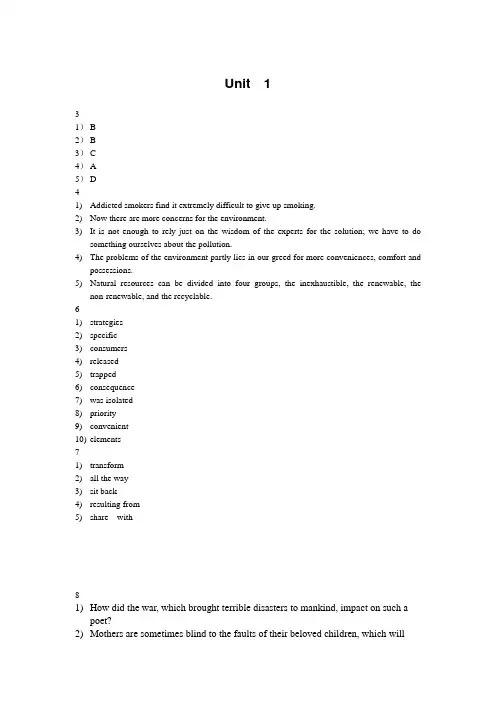
Unit 131)B2)B3)C4)A5)D41)Addicted smokers find it extremely difficult to give up smoking.2)Now there are more concerns for the environment.3)It is not enough to rely just on the wisdom of the experts for the solution; we have to dosomething ourselves about the pollution.4)The problems of the environment partly lies in our greed for more conveniences, comfort andpossessions.5)Natural resources can be divided into four groups, the inexhaustible, the renewable, thenon-renewable, and the recyclable.61)strategies2)specific3)consumers4)released5)trapped6)consequence7)was isolated8)priority9)convenient10)elements71)transform2)all the way3)sit back4)resulting from5)share---with81)How did the war, which brought terrible disasters to mankind, impact on such apoet?2)Mothers are sometimes blind to the faults of their beloved children, which willcause the children to make the same mistake again.3)As a new immigrant in this completely country, she always felt isolated.4)Acting before thinking often results in failure, so we should think before we leap.5)The time for talking is past; we must take positive action to protect ourenvironment.121) D2) A3) C4) A5) B131)subtle2)were overtaken3)species4)decades5)boundaries6)audio7)directly8)focus9)tone10)cupped141)at that rate2)For the sake of3)come to4)by hand5)vice versa151)Young people sometimes complain of not being able to communicate withtheir parents.2)Mary has been longing to take up residence in a Chinese village in Yunnanfor a few years. Now her dream has come true.3)Domestic animals are used to depending on humans, so it is difficult for themto survive in the wild.4)He was suddenly overtaken by a fear that he would be laid off by thecompany because of depression.5)I figure he will be back soon since he promised to have dinner with me.171)我们大多数人只是袖手旁观,还会说:“让专家去处理吧。
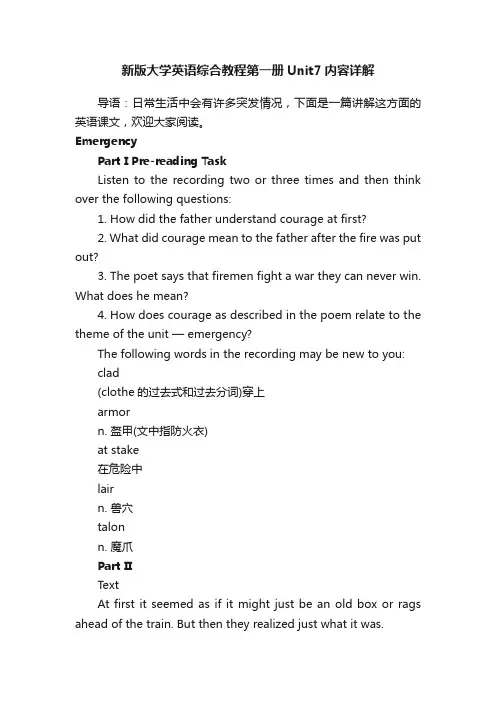
新版大学英语综合教程第一册Unit7内容详解导语:日常生活中会有许多突发情况,下面是一篇讲解这方面的英语课文,欢迎大家阅读。
EmergencyPart I Pre-reading TaskListen to the recording two or three times and then think over the following questions:1. How did the father understand courage at first?2. What did courage mean to the father after the fire was put out?3. The poet says that firemen fight a war they can never win. What does he mean?4. How does courage as described in the poem relate to the theme of the unit — emergency?The following words in the recording may be new to you:clad(clothe的过去式和过去分词)穿上armorn. 盔甲(文中指防火衣)at stake在危险中lairn. 兽穴talonn. 魔爪Part IITextAt first it seemed as if it might just be an old box or rags ahead of the train. But then they realized just what it was."KIDS ON THE TRACK!"Jack MurphyMonday, May 1, 1989 was a pleasant morning in Ramsey, N.J. Kate Pritchard bent over her car trunk and struggled with the bags of groceries she'd just brought home. She heard the distant cry of a locomotive horn. The trains of Conrail passed less than 300 feet from the Pritchards' house. No fence separated their backyard from the track — only a thick row of trees. But, her sons, 3(1/2)-year-old Todd and 18-month-old Scott, were nearby, playing on the driveway."Stay right there," Kate said, "while Mommy puts the groceries away. Then we'll go inside and have lunch, okay?""Okay!" said Todd, giving a thumbs-up gesture he'd seen his father make."Okay!" echoed Scott, trying to copy his older brother.They watched their mother enter the house with several bags.Kate shut the refrigerator and hurried outside. Good. The boys were playing right where she'd left them.As she lifted more bags from the trunk, Kate heard a train race past — a passenger express, she judged from its speed. She carried more bags into the house.The sounds of the train apparently drew the boys' attention to the track. After making their way through the trees, they climbed to the top of the steep roadbed, knelt down along the railroad and began to play.A few thousand feet west, a freight train rolled slowly toward the children. Overhead lights signaled to engineer Rich Campana that the passenger train ahead was out of the way, and they could resume their normal speed of 40 miles per hour. The engineer adjusted the accelerator, then turned to conductor Anthony Falzo,a man, medium in height and strongly built, who had worked for Conrail for almost half of his 35 years."So what'd you do over the weekend, Anthony?""Oh, not much. Mostly messing around — a little TV, then bed. What else?"Campana smiled. "Hey, you'd better cool down, Anthony —you're getting to be a real party animal!"The two men laughed. They were still laughing as the train began gathering speed, moving at 21 miles per hour.Rich and Anthony spotted something ahead at the same instant."What's that up there?" asked the engineer. Anthony didn't answer. Staring intently, he was trying to identify the curious shape on the track ahead. A box? Old rags?Suddenly both men realized what it was. Rich threw on the emergency brake and pulled on the air-horn handle with all his strength.The horn's blast and Anthony's words exploded at the same time: "Kids on the Track!"Anthony sprang through the cab door onto a narrow running board six feet above the wheels and raced to the front of the swaying train. Climbing quickly down a steel ladder, he paused at the bottom, two feet above the roadbed flashing by.Now he could clearly see the two little children. They were sitting alongside the rail. Anthony waved wildly and shouted, "Get away! Get away!"He mentally calculated the train's deceleration rate and groaned. We'll never stop in time.Absorbed in play, Todd and Scott did not hear the train. Finally, as the sound became thunderous, Scott looked up andfroze.Though the train was slowing, Anthony knew it was still going faster than he could run. So he forced himself to wait until he would be close enough to leap off and grab the boys. With perhaps ten feet left between them and the sharp-edged snowplow blade at the front of the train, Anthony sprang forward from the ladder. Landing on the loose, fist-size stones alongside the track, he had to struggle to keep his balance. In two giant steps he almost reached the children. They stared up at him in wide-eyed shock. Anthony, throwing his body into space, flew toward them.The unending blast of the train horn struck Kate Pritchard like a hammer blow. "The boys! " she cried, and raced out the door. They were gone!The track, she thought. I must get to the track!As his body crashed downward, Anthony covered Todd while reaching out with one arm to grab Scott and pull him clear of the track. But the train had caught up to them. Anthony saw the black steel edge of the snowplow blade hit the young child under the chin, driving his head back and scraping over his face. Instantly, blood flashed across the boy's forehead.Part of the train then punched into the back of Anthony's work jacket, tearing the nylon fabric. Still, Anthony managed to pull Scott completely under him.He's dead, Anthony thought. He felt sick with horror. Burying his face in the stones, he pushed downward on the two boys with all his strength as the train passed inches above them.The first person Kate saw when she reached the halted train was Todd. Her older boy was jumping up and down and crying uncontrollably. But Kate could see he wasn't injured. She grabbedand hugged him. Then she saw the still figure of a man lying under the third car. Scott's head, a mask of darkening blood, was visible under him. Kate ran to them. "Scott!" she screamed.Anthony twisted to face her. "Lady," he said, his voice calm, "go to your house. Call the police and ambulance." Kate, only half hearing him, extended her arms to take her baby. Anthony spoke again, more sharply, "Ma'am, listen! Go to your house and call the police — call an ambulance. Go!"Kate tore back to the house, made the calls, then reached her husband, Gary, via his beeper.When the first police car arrived, Anthony was still holding little Scott. The conductor knew from the child's cries that he was alive, but Scott might have internal injuries that any movement could worsen. So Anthony insisted the emergency personnel check the boy before he would release his grip. Miraculously, Scott's injuries were not serious, requiring just 13 stitches.There had only been 14 inches between the plow blade and the ground. Reporters later asked Anthony if he had hesitated before risking his life."No," he replied. "All I could think was that those two little kids have their whole lives still ahead of them, and if I do nothing, they're dead. There was no way I could let that happen."Soon after the incident, Anthony visited the Pritchards' home. He recalls putting his arms around Todd and Scott and lifting them. "It made me remember the moment when I first sheltered them under the train. It was a strange feeling, holding them again — and wonderful too."Since that first visit, the Pritchards say that Anthony has almost become a member of the family. They also report that a fence now separates their neighborhood from the railroad track.New Words and Expressionstrunkn. 汽车后部的行李箱struggle withhave difficulty handling or coping with 费力地对付groceryn. (usu. pl) 食品杂货locomotiven. 机车hornn. 喇叭nearbya., ad. 附近的;在附近thumbs-upn. 翘拇指(赞同或满意的表示)gesturen. 手势;姿势echov. repeat (another's words, ideas, etc.) 重复draw sb.'s attention tomake sb. aware of (sth.) 引起(某人)注意steepa. rising or falling sharply 陡峭的kneelvi. go down on the knees; rest on the knees 跪下;跪着freightn. 货物;货运overheada. above one's head; in the sky 在上头的;架空的signalv. send ( sth. such as a warning or a message) by a light or an act 发信号传达out of the way远离,不碍事resumevt. begin again after a pause 重新开始,恢复perprep. for each 每acceleratorn. 加速器,加速装置conductorn. (AmE) 列车员mediuma. coming halfway between; not extreme 中等的n. a means which can be used to express or communicate sth. 媒质,媒介messvt. put into disorder 弄乱;弄脏n. 混乱;脏乱mess around(infml) do things in an aimless way; spend time playing 随意做事;闲荡heyint. 嗨(用以唤起注意等)cool down(cause to) become calmer (使)冷静下来spotvt. see or recognize 看出,认出instantn. 片刻,瞬息intentlyad. with great attention 专心地ragn. 破布;抹布;(pl)破旧衣服braken. 制动器,刹车pull on用力拉with all one's strength使劲,用全力blastn. (汽笛等的)鸣叫explodevi. burst with a loud noise 爆发;爆炸swayv. (cause to)move or swing slowly from side to side (使)摇动;(使)摇摆flashvi. move very fast; produce a sudden bright light 飞驰,掠过;闪烁calculatev. 计算decelerationn. 减速groan▲v. 呻吟thunderousa. extremely loud 雷鸣似的;极响的leapvi. jump 跳,跃grabv. seize suddenly; take roughly and quickly 猛地抓取bladen. 刀刃,刀身;刀片loosea. 松散的hammern. 榔头,锤crashvi. fall or strike suddenly, violently, and noisily 突然重重倒下;坠毁;碰撞reach outstretch one's arm, usu. in order to get or touch (sth.) 伸手抓clear offree from, not in contact with 离开;不接触scrapev. 刮,擦instantlyad. at once; immediately 立即,即刻foreheadn. 前额punchv. hit hard 猛击,用力击nylonn. 尼龙fabricn. 织物,织品;构造,结构horrorn. great fear or shock 恐惧,震惊up and down一上一下地injurevt. harm, hurt;damage 损害;伤害injury n.hug▲vt. hold tightly in one's arms 紧抱maskn. 面具,面罩visiblea. that can be seen 看得见的,可见的twistv. 转动;(使)扭曲;扭伤ambulancen. 救护车ma'am = madam女士,小姐viaprep. by means of; by way of 通过;经过beepern. BP机,拷机internala. of or in the inside 内部的;内在的miraculouslyad. like a miracle 奇迹般地stitch▲n. (缝合伤口、缝纫、刺绣等的)一针,针脚riskvt. put (sth.) in a dangerous position 使遭受危险n. 危险,风险no way(infml) in no way; definitely not 不行;决不incidentn. sth. that happens 事情;事件sheltervt. protect; cover 保护;遮蔽n. 隐蔽处;躲避处Proper NamesJack Murphy杰克·墨菲Ramsey拉姆齐(地名)N.J.= New Jersey(美国)新泽西州Kate Pritchard凯特·普理查德Conrail联铁(一家主要在美国东北部营运的铁路公司,Consolidated Rail Corporation的缩合词)Todd托德(男子名或姓氏)Scott斯科特(男子名或姓氏)Rich Campana里奇·坎普纳Anthony Falzo安东尼·法尔佐Gary加里(男子名或姓氏)向你推荐的相关文章相关文章列表微信扫码分享。
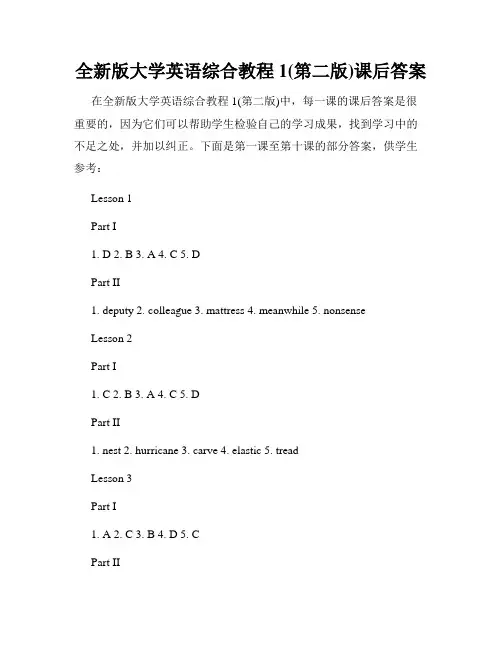
全新版大学英语综合教程1(第二版)课后答案在全新版大学英语综合教程1(第二版)中,每一课的课后答案是很重要的,因为它们可以帮助学生检验自己的学习成果,找到学习中的不足之处,并加以纠正。
下面是第一课至第十课的部分答案,供学生参考:Lesson 1Part I1. D2. B3. A4. C5. DPart II1. deputy2. colleague3. mattress4. meanwhile5. nonsenseLesson 2Part I1. C2. B3. A4. C5. DPart II1. nest2. hurricane3. carve4. elastic5. treadLesson 3Part I1. A2. C3. B4. D5. CPart II1. pasture2. dwarf3. stall4. tangible5. kin Lesson 4Part I1. B2. D3. A4. C5. APart II1. soar2. torch3. scatter4. heir5. kneelLesson 5Part I1. C2. A3. B4. D5. APart II1. parcel2. albeit3. climax4. seam5. amplify Lesson 6Part I1. A2. D3. C4. B5. DPart II1. commonplace2. tramp3. tangle4. cling5. utensil Lesson 7Part I1. C2. B3. D4. A5. CPart II1. stance2. clatter3. adjunct4. clog5. flourish Lesson 8Part I1. A2. D3. C4. B5. DPart II1. conspicuous2. suffice3. ornament4. flatter5. stir Lesson 9Part I1. B2. C3. D4. A5. CPart II1. pigeon2. span3. nuisance4. paranoid5. brood Lesson 10Part I1. C2. A3. B4. D5. APart II1. clip2. retort3. thrive4. mound5. veil以上是第一至第十课的部分答案,希望同学们认真对照课本内容,检验自己的答题情况,不断提高英语水平。
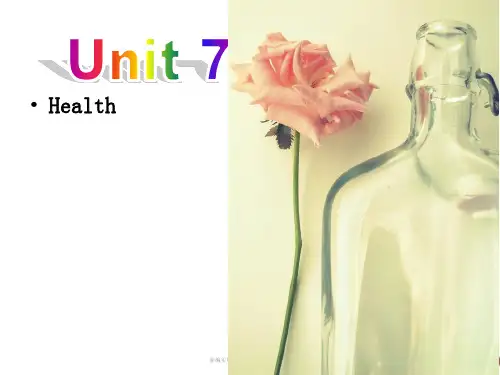
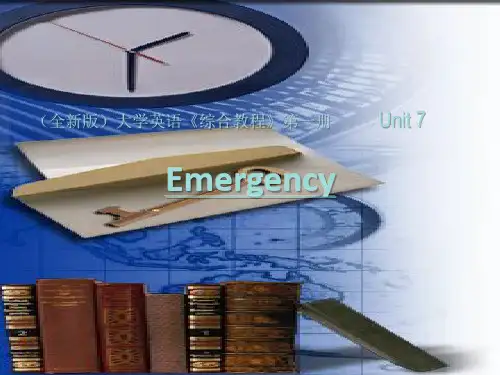
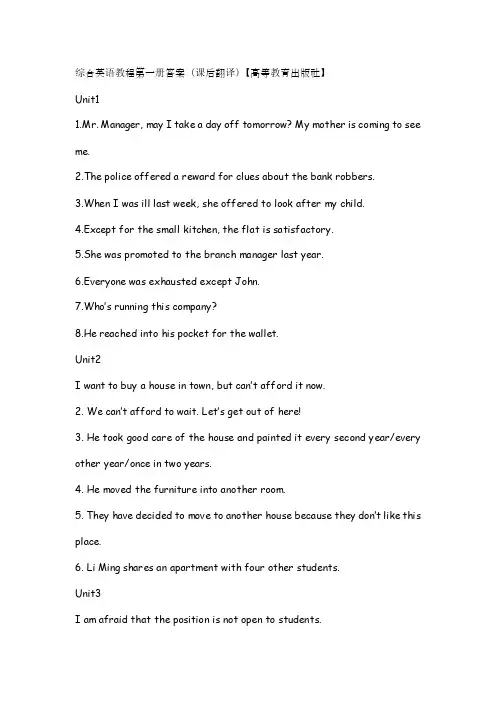
综合英语教程第一册答案(课后翻译)【高等教育出版社】Unit11.Mr. Manager, may I take a day off tomorrow? My mother is coming to see me.2.The police offered a reward for clues about the bank robbers.3.When I was ill last week, she offered to look after my child.4.Except for the small kitchen, the flat is satisfactory.5.She was promoted to the branch manager last year.6.Everyone was exhausted except John.7.Who’s running this company?8.He reached into his pocket for the wallet.Unit2I want to buy a house in town, but can’t aff ord it now.2. We can’t afford to wait. Let’s get out of here!3. He took good care of the house and painted it every second year/every other year/once in two years.4. He moved the furniture into another room.5. They have decided to move to another hous e because they don’t like this place.6. Li Ming shares an apartment with four other students.Unit3I am afraid that the position is not open to students.2. I came across a letter from France the other day.3. He put his hand on his chest as if to show sincerity.4. I’ve filled out the application form.5. She had her coat on.6. I can’t help thinking that we’ve made a big mistake.7. Fred is short for Frederick.8. He seemed in his early thirties.Unit41,You can look up the phone number of the company in the phone book (directory).2. Outmoded conventions and bad customs should be done away with.3. As far as I know, they cannot finish the project ahead of schedule.4. As far as the structure is concerned, the article is good, but the content needs to be enriched.5. Chances are that the train will be late. You needn’t worry so much for him.6. In daily life, gas has replaced coal as fuel.7. Young people should learn to be independent from their parents.Unit51,What is the average monthly income of the people in shanghai?2. She is improving in health.3. Compared with five years ago, my income has doubled.4. After the traffic accident, he was handicapped for life.5. Investigation has shown that Chinese made color televisions are not inferior in quality to imported brands.6. What you said won’t change my position on the matter, but I will take your opinion into serious consideration.Unit61,Three days’ hard work made John tired out.2. This point is no doubt quite absurd.3. I was about to answer the phone when the door-bell rang.4. Please place the book back when you have finished reading it.5. The meeting was prolonged into evening.6. Maggie spends almost all her spare time reading, to the exclusion of other entertainment.Unit71,If you a re very busy, don’t bother to come to see me.2. The new teaching programme is well received by the students. It has a surprisingly good effect on their study.3. On that holiday the streets are filled with joyful people.4. Modern Western music was first developed in Italy.5. Everyday before starting to work, I will browse the day’s papers.6. I like drinking coffee while enjoying music at leisure.7. The film will begin in twenty minutes.8. The teacher gave us a lecture on Shakespeare and his tragedies.9. I could have left my keys in the office. 10. By the end of this year, we must complete the project.Unit8Unit91,Scientists assume that there is no life on Mars.2. Different nations have different ways of life.3. Health has something to do with diet.4. The two photos look so alike that I can’t tell who’s who.5. This article does not make any sense.6. \on my way to the company, I tried to anticipate the kind of questions the manager would ask me at the interview.7. It is reported that no one died in the fire.8. Although the two companies have the same name, they have nothing to do with each other.9. What would you like to drink—coffee or tea?Unit101,It’s very difficult to get across Chinese humor to foreigners.2. Weather determines the growth of crops.3. When she saw him go, she went as well.4. Eating too much often results in illness.5. This book has exerted/had a great impact on a whole generation.6. Once in a while he goes/went fishing.7. This paper represents important findings in our recent research.Unit111,Most people like summer. As for me, I like winter better.2. He wants to take up photography when he grows up.3. It suddenly occurred to him that he had taken the wrong bus.4. She devoted her life to teaching.5. If you have made a plan, you much stick to it.6. I can’t help it if he doesn’t come to the meeting.7. The author skillfully wove those incidents into a story.8. The students are all eager to know the results of the exam.Unit131,West Lake in Hangzhou attracts tourists from home and abroad alike.2. Through our campus flows a small river, along the banks of which stand many willow trees.3. The field of wheat stretches to the small hill.4. This restaurant serves delicious food.5. So far, we are satisfied with his work.6. It is said that some foreign guests will come to visit our campus.7. This supermarket sells everything from household electric appliances to matches.8. This building is let to a businessperson.Unit141,Every morning when I wake up, I expect something excting will happen.2. That person in red is our teacher.3. The improvement of the traffic conditions has greatly contributed to the business growth in this area.4. She is too excited to say a word.5. Children all delight in animal stories.6. I often tried to persuade her to be more careful, but my attempts were always in vain.7. His face turned red when he realized his mistake.Unit15一,Translate the following sentences into English.1,He came upon a good idea.2. His hard work paid off. He got a promotion.3. John spends some time playing with his children every weekend.4. This article can serve as a model.5. As long as you keep trying, you will surely succeed.6. You can stay as long as you like.7. The meeting room is decorated with flowers.8. Her room is very tidy. Everything is in its place.9. It takes time to write a book. The teacher made a joke and the class came alive immediately二,Put the following into English.1. I can only tell you how many people were killed in the fire. As for the cause of the fire, I don’t know myself.2. The new peace treaty bans all tests of nuclear weapons.3. Tom has already made apologies to John. But J ohn’s hostility toward Tom still lingers.4. Why not change our traditional teaching methodology?5. It is very difficult to lose weight. In contrast, it is easy to put on weight.6. Since you have already employed me, you should not challenge my competence as a teacher.7. Ken maintained that he was not guilty.。
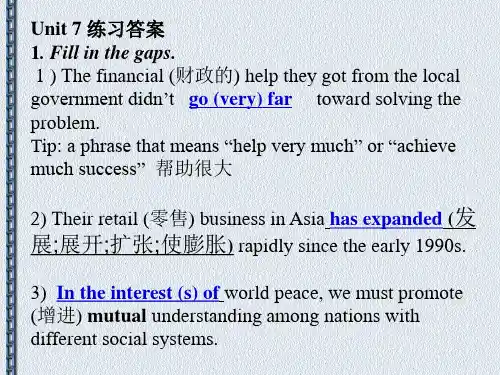
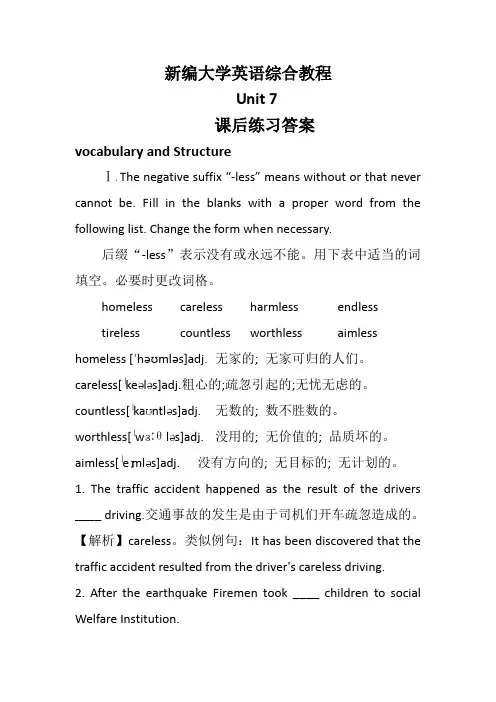
新编大学英语综合教程Unit 7课后练习答案vocabulary and StructureⅠ. The negative suffix “-less” means without or that never cannot be. Fill in the blanks with a proper word from the following list. Change the form when necessary.后缀“-less”表示没有或永远不能。
用下表中适当的词填空。
必要时更改词格。
homeless careless harmless endlesstireless countless worthless aimless homeless [ˈhəʊmləs]adj. 无家的; 无家可归的人们。
careless[ˈkeələs]adj.粗心的;疏忽引起的;无忧无虑的。
countless[ˈkaʊntləs]adj. 无数的; 数不胜数的。
worthless[ˈwɜːθləs]adj. 没用的; 无价值的; 品质坏的。
aimless[ˈeɪmləs]adj. 没有方向的; 无目标的; 无计划的。
1. The traffic accident happened as the result of the drivers ____ driving.交通事故的发生是由于司机们开车疏忽造成的。
【解析】careless。
类似例句:It has been discovered that the traffic accident resulted from the driver's careless driving.2. After the earthquake Firemen took ____ children to social Welfare Institution.【解析】homeless。
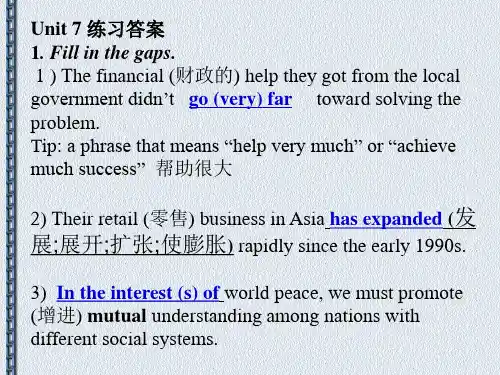

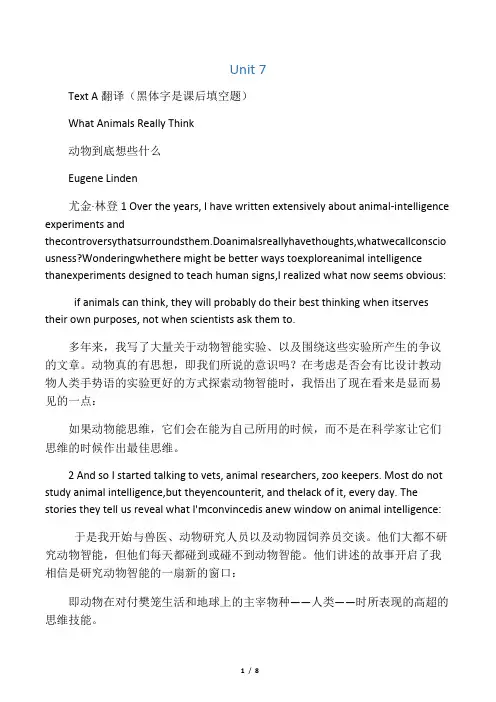
Unit 7Text A翻译(黑体字是课后填空题)What Animals Really Think动物到底想些什么Eugene Linden尤金·林登1 Over the years, I have written extensively about animal-intelligence experiments andthecontroversythatsurroundsthem.Doanimalsreallyhavethoughts,whatwecallconscio usness?Wonderingwhethere might be better ways toexploreanimal intelligence thanexperiments designed to teach human signs,I realized what now seems obvious:if animals can think, they will probably do their best thinking when itserves their own purposes, not when scientists ask them to.多年来,我写了大量关于动物智能实验、以及围绕这些实验所产生的争议的文章。
动物真的有思想,即我们所说的意识吗?在考虑是否会有比设计教动物人类手势语的实验更好的方式探索动物智能时,我悟出了现在看来是显而易见的一点:如果动物能思维,它们会在能为自己所用的时候,而不是在科学家让它们思维的时候作出最佳思维。
2 And so I started talking to vets, animal researchers, zoo keepers. Most do not study animal intelligence,but theyencounterit, and thelack of it, every day. The stories they tell us reveal what I'mconvincedis anew window on animal intelligence:于是我开始与兽医、动物研究人员以及动物园饲养员交谈。
Listening and SpeakingReading prehension3.Key for reference2) Cultural misunderstandings can occur when people don’t share or understand the rules of a particular culture. The rules of how you behave are to do with what people expect you to do in certain situations. People can learn the rules of a new culture by watching people and through asking questions. It is cultural values that lead to expectations and rules about how people behave.Language in Use∙1) symbolize∙2) involved∙3) appreciates ∙4) extend∙5) engaging∙6) embarrassed ∙7) intimate∙8) associations ∙9) equality∙10) threatened5.∙1) stretch out∙2) vary with∙3) associate with∙4) drop in∙5) ment on∙6) fended off∙1) physical distance∙2) long distance∙3) personal space∙4) living space∙5) current situation∙6) walking distance∙7) parking space∙8) financial situation7.∙1) check-in∙2) feedback∙3) update∙4) sweetheart∙5) crossroad∙6) earthquake∙7) highlight∙8) real estate8.Reference translation1) 人和人之间的身体距离因其关系亲疏和地位高低而不同。
新世纪大学英语综合教程1-课后答案-第二版--秦秀白Unit-7-Interpersonal-ReUnit 7 Interpersonal Relationship: Keys to the exercisesEnhance Your Language Awareness1 Listed in the boxes below are some of the words that you need to beveryfamiliar with. Now work in pairs and make sentences with each ofthem tosee if you have really mastered their usages. You are encouraged to consult adictionary if you are still not quite sure abouttheir meanings and usages.1) Every year before Christmas, we decorate our house with colourful lights.2) Mother scolded John for not taking good care of his younger brother when she went out.3) I quickly picked up a stick to defend myself when I saw a big dog running towards me.4) Please don’tinterrupt —wait until I have finished what I have to say.5) The mother embraced her son warmly as soon as he came into the house.ancient; he bought it 15 years ago and it is still in good condition.6) Jimmy’s car is quite7) When I arrived I saw that the place had already been occupied by two strangers.8) You have written a very good paper. I only made a few minor changes in the wording.9) At different stages of our life, we encounter different kinds of problems.10) If you need any assistance, please let me know and I’ll be more than happy to help.11) Some people tend to blame others for what they themselves have done wrong.burden for many families to bear these days.12) Children’s education is becoming too heavy aendure to see / endure seeing animals suffer like that.13) I can’t14) Davis was one of the most significant musicians of the last century.2 In the box below are some of the words you have learned in this unit. Completethe following sentences with them. Change the form wherenecessary.1) The home address was incomplete, so the letter could not be delivered.2) His father was finally released after he was proven to be innocent (无辜的), but he had already spent ten years in prison.3) Did he give you permission to use his computer?4) All rooms in this building are rented to students because it is closeto their university.5) When she recalled her miserable days during the war, my motherwould cry bitterly.6) When I told George that Maggie had refused to help, he exploded and walked out without saying anything.7) She pressed her dress smooth using a hot iron.8) With a(n) motion of his hand, he urged us to follow him.9) As soon as she accepted the job, Janet started workingwith great enthusiasm.10) Though she is over seventy, she is blessed with excellent health.11) The old woman was hurt so deeply by what his son had said thatshe trembled with rage.12) Just complete the attached form and return it in the envelopeprovided.13) The waiter inquired whether we would like to sit near the window.you now deserve a rest.14) You’ve been working all morning —3 In the boxes below are some of the expressions you have learned inthis unit. Doyou understand their meanings? Do you know how to usethem in the propercontext? Now check for yourself by doing theblank-filling exercise. Change theform where necessary.1) She is a very responsible lady; with her in charge, I am sure nothingwill go wrong.2) We were half way on our journey when our car broke down.3) I have lost my watch and I am quite certain I lost it on my way to thecomputer room.4) The child is very independent. He wants to make all importantdecisions by himself.5) This little girl is a dancing genius; she could dance in time to themusic as young as three years old.6) Our manager has to deal with all kinds of complaints the staffmembers make.7) She knew her subject from top to bottom and breezed through theexam in less than an hour.8) Several days had gone by before we found the missing dog.9) To my surprise, I was given the job, even though I had sent in myapplicationrather late.●Increasing Your Word Power1 A synonym is a word that has the same or nearly the same meaningas anotherword. Now identify synonyms by matching a word inColumn A with anotherin Column B. Then complete the sentenceswith an appropriate word either inColumn A or in Column B. Changethe form where necessary.1) They endured hours of backbreaking work in miserable conditions.2) Some of the boys in our class are going to skip today’s class; I wonderhow teacher will respond to it.3) She is a teacher and spent most of her career in New York.4) The wearing of seat belts is required by the law.5) Sally didn’t feel quite well, but still dragged herselfwearily out ofbed at fiveo’clock that morning.6) This new play was directed by Mike Johnson, assisted by Sharon Gale.7) It’s her birthday party so I need agift of some sort to take along.8) Tom is a stubborn child who won’t obey his mother.9) I’m not joking; I’mserious.10) From the house come bursts of merry laughter.11) Our tour departs from Heathrow Airport on 31 March and returns16 April.12) Barbara scolded her son for being so naughty before the honourable guests.13) There are no significant differences between the two groups ofstudents interms of their IQ.2 An antonym is a word that means the opposite of another word. Nowidentifyantonyms by matching a word in Column A with another inColumn B. Thencomplete the sentences with an appropriate wordeither in Column A or inColumn B1) With no thought for his own safety, he ran into the burning buildingto save thechild.2) He waited the whole day for her to call him back, but no phone callcame. Hewas so annoyed that he went to bed miserably.3) Listen! The girls are singing cheerfully in the next room. They mustbe having alot of fun together.akes.4) He did his work carelessly. That’s why he made so many mist5) Jim knew absolutely nothing about the business when he joined thefirm.6) He looked round desperately for someone to help him.7) The news report does not mention who is to blame for the trafficaccident.8) He left his hometown as a poor, working class boy and returned asanextremely wealthy man.9) I don’t like theboring / dull atmosphere in our class; I thinkeveryone should tryto be more active in class.10) She wanted to be the first woman to climb Mount Everest, andshealmost succeeded.3 The words in the box below can be used both as nouns and as verbs.Useeither the noun form or the verb form of the words to complete the followingsentences. Change the form where necessary.still feeling1) I got so mad with him that I slapped him hard across the face; I’msorry for what I did then.2) On my birthday one of my friends gave me a beautiful doll as a(n)present.3) She finally solved the problem! A smile lit up her face.4) The little donkey struggled under a heavy burden.5) He was so angry that he reached forward and gave her a(n) slap onthe cheek.6) Janet presented the director with an expensive painting asa partinggift from usall.7) I ordered a chicken and some beer and started eating and drinkingby myself.8) The lake was bathed in the soft light of the moon.9) The government is spending millions of dollars in its attempt to combat drugabuse (毒品滥用).10) She motioned me to come closer and slipped something into myhand.11) The strain on the cables (绳缆)supporting the bridge is enormous.12) You can place an online order and they will deliver the goods to thedoor.13) They strained the rope between the two posts.14) I don’t want toburden you with my problems.15) With a sweeping motion of his hand, he said, “Follow me closely.”16) Helen volunteered to have the New Year party at her house this year.17) The troops were exhausted after months of fierce combat.18) She now helps in a local school as a(n) volunteer three days a week.4 Did you notice the suffixes -ness, -ment in words such as illness, disappointmentin this unit? The suffix -ness can be put after manyadjectives to form nouns, while -ment can be added to many verbs toform nouns.Now form nouns byadding -ness or -ment to the words given in thetable and write down theChinese meaning for each.Adjectives / Verbs Suffixes Nouns Chinese Meaningsaccomplish-ment / -ness accomplishment 成就;造诣;完成adjust adjustment 调节;调整;校正appoint appointment 约会,约定;任命,委派aware awareness 意识;知道;觉悟calm calmness 平静;安静;镇静competitive competitiveness 竞争;竞争力develop development 形成;开发;发展effective effectiveness 效力;有效性encourage encouragement 鼓励;赞助;促进impulsive impulsiveness 冲动;推动;驱使Complete each of the following sentences with a proper word you have thusformed.1) There has been an increasing awareness that care of the elderly hasbecome a social problem.2) We need encouragement from each other in order to complete sucha huge project.3) With so many caregivers around her, the old woman feelsa sense ofsecurity and calmness.4) To ensure competitiveness in market, the company spares no effortto improve the quality of its products.5) We are very proud of the accomplishments that we have made overthe past few years.6) If you want to see the director, you need to make a(n) appointment with him first.7) When travelling abroad, you should make necessaryadjustments tothe cultural differences.8) Take your time and think about it twice so as to avoid impulsiveness in your decision.9) A series of clinical trials (临床试验)are conducted to test the effectiveness of the newly developed medicine.10) There have been significant technological developments in thiscountry in the last two decades.Grammar in ContextStudy the following sentences that appear in this unit, paying specialattention tothe italicized parts. Reflect on the grammatical functionof the present participles,and group them into different types.1) a. Adverbial of time: 2, 4, 62) b. Adverbial of reason: 9, 103) c. Adverbial of result: 84) d. Adverbial of accompanying circumstances: 1, 3, 5, 7Task 1: Rewrite the following sentences using a present participleclause.1) He sat silent in the corner. He was reading his favorite novel.He sat silent in the corner, reading his favorite novel.2) When she saw the traffic light turn green, she quickly crossed the road.Seeing the traffic light turn green, she quickly crossed the road.3) As he has engaged in the research for many years, he is quite familiar withthe topic.Having engaged in the research for many years, he is quite familiar with the topic.know where the supermarket was, so he went up to the policemanto 4) He didn’task for directions.Not knowing where the supermarket was, he went up to the policeman to ask fordirections.5) A new economic stimulus plan is said to be unveiled, and it leads to a surgein the stock market.A new economic stimulus plan is said to be unveiled, leading to a surge in the stockmarket.Task 2: Rewrite the following sentences to avoid ambiguity or danglingconstructions.1) Opening the window, a butterfly flew into my study.Opening the window, I saw a butterfly flying into my study.Or: When I opened the window, a butterfly flew into my study.2) Weighing almost 100 pounds, he lifted up the stone with one arm.Weighing almost 100 pounds, the stone was lifted up by him with one arm.Or: Although the stone weighed almost 100 pounds, he lifted it up with one arm.3) Idling about all day and indulging in games, the teacher flunked (使…不及格) the student in the final exam.Idling about all day and indulging in games, the student was flunked by theteacher in the final exam. 4) Having lived in the small county for thirty years, everything is familiar to the old man.Having lived in the small county for thirty years, the old man is familiar witheverything.5) Having received the Nobel Prize in literature, the mediabombarded (向…连续提问) Mo Yan with questions of various types.Having received the Nobel Prize in literature, Mo Yan was bombarded withquestions of various types from the media.ClozeComplete the following passage with words chosen from this unit. Theinitial letterof each is given.Being a good boss has never been easy for me. The most difficult part is not about work, but about d ealing (1) with relationships at the workplace. As each and every employee in my company is s ignificant (2) to its development, I need to give enough a ttention (3) and care to everyone and to be approachable to all. At the start of the business, I encountered difficult situations and I was unsure what the best way was to handle them. For example, when an employee made a mistake, I hesitated about whether to s cold (4) him or her. Would I appear to be an i mpatient (5) boss to my employees if I did so? Would they continue to make mistakes if I was too lenient? Sometimes, I had to s ettle (6) disputes among the employees if they did not see eye to eye with each other on some tasks. This too was difficult. Should I b lame (7) any party or should I d efend (8) anyone? Howwould I bring them to see their differences and find solutions without h urting (9) each other? Sometimes I also e ncountered (10) difficult employees who seemedto feel m iserable (11) whatever I did for them. Life has never been easy, but Ihave learned the ropes along the way. The essential principle is to treat the employees s incerely (12), appreciate theircontributions to the company andreward them accordingly. My employees are happy to have me as their boss, and are offering me all the a ssistance (13) they could. They have great e nthusiasm (14)for their work and have contributed significantly to the c ompany’s development. TranslationTranslate the following sentences into English, using the words givenin brackets.1) 直起身来,脚要跟上音乐拍子。
BOOK 1 - Unit 7 - Language Focus - Vocabulary1.Fill in the gaps with words or phrases given below. Change the form where necessary.1). The financial (财政的) help they got from the local government didn't [go far / go very far] toward solving the problem.2). Their retail (零售) business in Asia [has expanded] rapidly since the early 1990s.3) .[In the interest of / In the interests of] world peace, we must promote (增进) mutual understanding among nations with different social systems.4). I thought it was still early, yet I got to the library [only to] find it closed.5. On the train I [encountered] an old lady who happened to be a neighbor of my daughter's when she lived in Los Angeles.6. Our company [has cooperated] with several American companies for the past few years in joint ventures.7. Phil looked around at the other competitors (竞争对手) and [assessed] his chances of winning.8. The police believed that the reason they failed to find anything suspicious in that guy's bag was that members of the gang (一伙歹徒) [(had) switched] bags at the airport.9. Our visit to the Far East has certainly broadened our [horizons].10. Emily felt increasingly uncomfortable under the woman's steady [gaze].11. Everything was going smoothly until suddenly the [disaster] struck.12. Smallpox (天花), which used to be a severe epidemic (流行性的) disease, has been completely [wiped out] .2. Rewrite each sentence with the word or phrase in brackets, keeping the same meaning. The first part has been written for you.1. Whether the book should be published or not was once an issue people disagreed about fora long time. (controversy over sth.)There used to be [a long controversy over whether the book should be published or not / a long-running controversy over whether the book should be published or not].2. Kate's first meeting with Tom went smoothly, which made her feel less uneasy. (relieve) Kate [felt relieved after her first meeting with Tom had gone smoothly].3. I was in the middle of writing the essay when my computer suddenly stopped working properly. (go wrong)Something [suddenly went wrong with my computer when I was in the middle of writing the essay].4. Clearly our company is still maintaining its position as market leader in software. (obvious)It [is obvious that our company is still maintaining its position as market leader in software].5. She insists on a pay rise, otherwise she will stop working for them. (give in)She is determined not to [give in until they give her a pay rise].3. Complete the following, using the words or phrases in brackets. Make additions or changes where necessary.1. Scientists [have undertaken] various kinds of [original] research projects [to explore] animal intelligence, but they still can't reach an agreement on whether it exists or not. (explore, original, undertake)2. Lots of [evidence convinced us] us that the lost ancient tunnel (地道) must have run right [underneath] the city, [extending to] the seashore. (extend, convince, evidence, underneath)3.We should try [to negotiate] a win-win solution when resolving issues we [encounter] in foreign trade. First we need [to figure out] what caused the problems. Then we should proceed to [explore] ways of solving them that are beneficial to both sides. (encounter, figure out, explore, negotiate)BOOK 1 - Unit 7 - Language Focus - Confusable WordsFill in the gaps with at first or first or firstly according to the context. 1. Phil studies management science [firstly] because he enjoys it and secondly because he wants to get a good job.2. Tickets can be bought here on a [first] come, [first] served basis.3. [At first] I thought the house was empty, then I heard a woman's voice come from the kitchen.4. [Firstly / First] I have to send the email to John, then I'll come shopping with you.5.When people get their newspaper, which page do they read [first]?BOOK 1 - Unit 7 - Language Focus - UsageFind eight similar phrases from the text and tell how the attributive noun modifies another noun.BOOK 1 - Unit 7 - Language Focus - Comprehensive Exercises1. Complete the following interview with Eugene Linden with words chosen from the Words and Phrases to Drill box. Change the form where necessary.Interviewer: You mention the case of one whale helping to save another in an [emergency](1). What does this suggest?Linden: Well, it seems to me that this is clearly [evidence](2) of [original] (3) thought. Here we see an animal [sizing up](4) a situation and then taking appropriate action in cooperation with humans.Interviewer: And when Jendry [negotiates](5) with Colo, what does that [reveal](6)? Linden: It shows that some animals, gorillas at least, are intelligent enough to bargain, to [make a deal] (7).Interviewer: Then there is the case of Miles and Chantek.Linden: Oh, yes. We like to think of ourselves as the [dominant](8) species, but that doesn't mean animals can't sometimes play tricks on us when it's [in their interest / in their interests](9).Interviewer: Like Melati [deceiving](10) Shewman?Linden: Exactly.Interviewer: So would you say your approach to the problem settles the [controversy](11) over animal intelligence?Linden: That's not an easy [judgment](12) to make, but it does, I think, open up interesting new paths to [explore](13).2. Read the following passage carefully until you have got its main idea, and then select one appropriate word for each gap from the box following the passage.Behavior is the way that animals act. For example, how do they get food or take care of their young? How do they find a place to live in or [protect] (1) themselves from danger? Much behavior is innate; that is, animals are born with it. [However] (2), animals learn much other behavior. There are several kinds of learned behavior.One simple [type] (3) of learned behavior is habituation. This happens when an animal learns to feel comfortable in a new [situation] (4) and doesn't pay attention to it anymore. For example, young horses are often afraid of noisy streets. But after a while, they learn to pay no attention to the normal [sights] (5) and sounds of a city.Another kind of learned behavior is conditioning. It is a way of learning by association —that is, by putting [together] (6) different ideas. In 1900, Ivan Pavlov, a Russian biologist, studied conditioning in dogs. Dogs innately salivate (produce liquid in the mouth) when they smell food. Pavlov [rang] (7) a bell every time he gave food to a dog. Soon the dog started to [associate] (8) the sound of the bell with the smell of food. After some time, it salivated when it heard a bell alone, [without] (9) food.Learning is important for all animals in a new [environment] (10). It allows an animal to be adaptable —that is, able to change in a new situation.3. Translate the following sentences into English, using the words or phrases in brackets.1. 当地一家公司承担了此项工程,但工程没完成就破产了。
Unit 7Part II Text AText Organizationi.2.Scenes Paragraphs Main EventsScene 1Paras 14-27 Anthony jumped from the train, coveredTodd, reached outwith one arm to grab Scott and pull himclear of the track. Then he pusheddownward on the two children with allhis strength.Scene 2Paras 28-33 Anthony got Kate to call the police andambulance. In themeantime, he was holding Scott for fear thatany movement could worsen the internalinjuries he might have.VocabularyI. 1.1) nearby2) signaled3)resumed4) spotted5)instant6) exploded7)swaying8) messing around9)leaped10) grabbed11)loose12) horror13)punched14) calculate15)clear ofII. Usage1. The sound of the engine became thunderous.2. He exploded: "Why didn't you tell me earlier!"3. The fireman sprang through the window into the room.4. He froze when he faced the audience.5. He stared at me in shock.6. Every morning, the policeman on duty will see thousands of cars flash by.7. The plane crashed into the mountainside, killing all aboard.III. Word Formation 1. possibility 3. amazement 5. widened 7. fulfillment2. highly 4. violation 6. neighborhood 8. determinationStructure1. 1) making 3) to ask 5) spending 7) to pay2. 1) With Christmas only a week away2) With his physical condition improving day by day 3) With our GDP growing steadily 4) With all the shops closed2) to kill 4) to think 6) being spoken 8) practicingComprehensive Exercises I. Cloze(A)1. incident3. instant5. horror7. grab9. loose11. all my strength13. punched(B)1. had3. with5. for7. with9. house2.leaping 4.spotted 6.calculating 8.clear of 10.reach out 12.scraped 14.internal2.when4.before6.herself 8.on10.other/older11.too 13.speak e 17.When 19.of 12.and 14.to 16.out 18.what 20.likeII. TranslationThe instant the professor entered the classroom, the words on the blackboard "Welcome Back Professor" drew his attention. He had been injured in a car accident, and had had several operations ina nearby hospital. The doctor calculated his chances of survival to be no more than 10%. Now, notonly had he recovered from his injury, but he was also able to resume teaching. Every student felt excited at the sight of him, and minutes passed before the class cooled down.Part TextBComprehension Check1. a 3. c 5. a 7. b2. b 4. d 6. dTranslation(#JSL Appendix III) Language Practice1. plunged 3. squeeze 5. hang on 7. presence 9. pressure 11.snapped 13. pray 15. up to2. wrapped 4. shivering 6. collapsed 8. conceal 10.crushed 12. trapped 14. nowherePart IV Theme-related Language Learning TasksModel paperA Near ThingOne afternoon when I was nine, I arrived home from school and found my younger brother lying in bed. "How come you are home so early?" I asked, knowing that he usually would mess around a bit after school. "I feel sick. I have a headache," he said.I could leave him in bed and wait until mom and dad came home from work. But I remembered hearing people say that there was an epidemic in the city. The disease developed rapidly and could cause damage to one's brain if not treated timely. "What if my brother has caught the disease?" I asked myself. I decided not to leave it to chance. So I called a taxi to take us to a nearby hospital.An hour later, my brother was sleeping in the isolation ward. The doctors there told my parents that if my brother had arrived at the hospital two hours later, the disease might have seriously damaged his brain.(162 words)。
最新版新起点大学英语综合教程第一册unit7Unit 7Section A: The Fall and Rise of a StarTeaching Objectives:1.理解课文A 和B 的文章大意,了解戏剧学习并非那么简单,只有“坚持”才能获得成功。
2.理解和正确运用重点词汇、短语和句型too…to…等。
3.掌握清辅音/p/ 和浊辅音/b/ 的不同发音。
4.学会正确使用副词。
5.了解京剧的化妆艺术。
Teaching Procedures:Part 1: Warm-up Activities1. Matching:Learn the following words and phrases about different types of dance, and match them to the pictures.2. Conversation: Listen to the conversation. Then practice with your partner, using the words and phrases provided on the right.Part 2: Text A: The Fall and Rise of a StarⅠ. Background Information1.Patty ZeitlinPatty Zeitlin is a teacher, writer, singer and music composer. She started her career in Los Angeles as a teacher of young children. Her life journey has taken her into teaching and training early childhood teachers, writing and recording songs for children and adults, writing books, poetry and scripts, and even performing with a puppet troupe. She is a dedicated professional, and an accomplished musician and writer. She has utilized her knowledge and understanding of young children and her artistic abilities in unusual and creative ways.Ⅱ. Words and phrases1. surea. confident that one is right; certain to do sth. 自信的;有把握的;确保的Can we be sure that he is honest? 我们能确定他是诚实的吗?2. try for sth.make an attempt to get or win sth. 力图获得或赢得某物try for a scholarship 力图获得奖学金try for an Olympic medal 力图赢得奥运会奖牌3. leadn. a principal part in a play, etc.; a person who plays the main character 剧中的主角;扮演主角的演员He is the lead guitarist of the group. 他是乐队的首席吉他手。
Script (Book One)Unit 1 My First JobZhang Gang pitched in as soon as he got a job at a hotel. He had to be punctual, hard-working and polite to the guests so as to meet the hotel’s standards, as he couldn’t afford to lose the job. He still owed a friend 800 yuan. He needed money. As he had just started, there was no hope of being promoted and it was not wise to bargain with the manager. His pay was 400 yuan a month. He figured that he would be able to pay back the money he had borrowed in four months’ time. He cleaned up the dining-hall twice a day and carried luggage for guests. His family didn’t like his taking a job as a janitor. Yet, for him, working at the hotel was a source of pride because he could earn money through honest labor. He beamed when he got his pay at the end of the first month.Unit 2Charles had just graduated from college. He worked at a food factory and earned enough to get by. He was still living with his parents, but wanted to move to a flat as soon as he could afford it. He had a girlfriend and hoped to get married and start a family. But he had to wait until his income went up so that he could save some money. His girlfriend, Clara, who was the same age as he, worked at a cleaning business, and earned less than Charles. They didn’t want to depend on their parents.Someday, they hope to have a council house, but for now they have to have patience.Unit 3 What’s in a Name?Strange things always happen to us. This morning, I went to a software company for a job interview. Since I was early, the receptionist asked me to wait for Mr. Lambert with two other girls who had come for the interview too. Just then a man about my age came in and gave his name to the receptionist. We couldn’t help wondering what he had come for when we heard him saying “job interview.” The receptionist seemed a bit surprised. She pointed to a seat next to us and said something to him. I could see that the man was rather embarrassed when we girls looked at him. I wondered if he knew that secretarial work is usually only open to women. It was a bit strange for a man to want to be a secretary.Unit 4 Waiting for a CallA woman is waiting impatiently at home, wondering if the man she loves will phone her. She has been waiting a long time. She doesn’t call him first because she doesn’t like to disturb his work. She imagines what she will say when he finally rings and decides to be sweet to him because she was nice to him at first. As time passes, she gets more and more impatient, until, by the end of the story, she is unable to wait any longerand starts to dial the number.Unit 5 English as Seen by AmericansAn African chief came to London for the first time when he was well past sixty. He had never left his own country before. A friend of mine went to call on him the morning after his arrival and asked him how he was and whether he was enjoying himself. The chief said he felt well but had had a frightening experience earlier that morning. “I went to Victoria station,” He said. “As a train came nearer and nearer to where I stood, all the doors swung open, and while the train was still moving, a great many men jumped out and began to run towards me.”Unit 6 A Delightful VillageI live in a large village in the countryside by the beach. Around my village lie fertile fields, in which grow a variety of crops throughout the year. In such a lovely environment you can avoid many urban troubles such as noise, pollution, and heavy traffic. I love to walk into the open country from time to time in the early morning, to enjoy the fresh air and watch the sun rise above the horizon. Through my village stretches a wide road, along the sides of which stand tall silver-barked trees. On fixed dates, the road serves as a free market. It is alive with local people who come to sell their farm produce and buy things for their households.Unit 7 Love in BloomIt was a bright, sunny day in early autumn. The Browns had gone to the country for an outing. The sunlight now slanted at a different angle and there was a breeze. The family finally reached the river. The parents began to make a fire. The kids took off their clothes and put them away. They got out their bathing suits, put them on and walked into the river. They swam and played in the water. Then there came the nice smell and sound of sizzling burgers. Before long, dinner was ready. The family sat beside the fire and enjoyed the meal immensely. The kids were beside themselves with joy. They were aware that the new term would soon begin. They were only too glad to have a bit of fun before they went back to school.。
1 Unit 7 When Lightning Struck Key to the Exercises
Text comprehension I. Decide which of the following best states the author’s purpose of writing. D
II. Judge, according to the text, whether the following statements are true or false. 1. F 2. F 3. T 4. T 5. F
IV. Explain in your own words the following sentences. 1. I tried to comfort her by saying that we would manage to tide it over. 2. After experiencing such an incident, the girl's visit to London would seem much less exciting in comparison. 3. The young woman, who was as confident as that businessman, must have noticed my fear. 4. The young businessman was sorry that he had not got a chance to buy his two little girls a present. 5. I am very grateful to my fellow passengers.
Vocabulary I. Explain the underlined part in each sentence in your own words. 1. having the seat belt fastened on 2. catch another flight to continue the journey 3. he had completed his task (announcement) 4. controlled my feelings and began behaving calmly again 5. land successfully and safely 6. am very grateful to do something nice in return
II. Fill in the blank in each sentence with a word or phrase taken from the box in its appropriate form. 1. witnessed 2. figured 3. lightning 4. lunged 5. confided 6. blessed 7. indiscriminate 8. terra firma 9. sure 10. creature
III. Choose a word or phrase that best completes each of the following sentences. 1-4 BACB 5-8 DDCB
IV. Fill in each blank with one of the two words from each pair in its appropriate form and note the difference in meaning between them. 1. a. somehow b. somewhat c. Somewhat d. Somehow 2. a. feared b. panic c. feared d. panicked 2
3. a. hope b. hope c. anticipating d. anticipate 4. a. surviving b. survive c. live d. live
V. Give a synonym or an antonym of the word underlined in each sentence in the sense it is used.1. open (unlock, unlatch, unchain) 2. hopelessly (unconfidently, despairingly) 3. think (believe, imagine) 4. unafraid (brave, bold, fearless, dauntless) 5. unselective (uncritical, random) 6. enjoyable (comfortable, agreeable, pleasant) 7. grumble 8. lightly (barely, hardly, scarcely)
VI. Fill in the blank in each sentence with an appropriate form of the given capitalized word in brackets. 1. ungrateful 2. shortage 3. unfortunately 4. invaluable 5. lengthen 6. destruction 7. timely 8. rustless
Grammar I. Identify the different infinitive forms after the modal auxiliaries. When a modal auxiliary takes the predictive meaning, the infinitive after it may appear in the perfect form to denote "past time" and in the progressive form to denote "future time." When the modal auxiliary takes the non-predictive meaning, the infinitive after it usually appears in its base form as in sentences 6 and 7.
II. Rewrite the following sentences, using “modal auxiliary + the correct form of the infinitive”.1. He may know the answer. 2. It must have been difficult. 3. He couldn't have forgotten his appointment. 4. She must be coming tomorrow. 5. We ought to help people in need. 6. May/Can I say something? 7. He may have gone to the museum. 8. You ought to have apologized.
III. Rewrite the following sentences, using be going to. 1. When are you going to start? 2. I'm sure it is going to rain. 3. I'm going to take a few days' holiday. 4. When are you going to sell it? 5. I'm sure there is going to be trouble. 6. We are going to have dinner out. 3
7. I'm going to watch the news. 8. We're going to be late for the party.
IV. Decide which of the underlined parts is correct. 1. I'm going 2. I'll carry 3. I won't tell 4. I'm going to be 5. are you meeting 6. It's going to rain 7. I'll post it 8. is going to take
V. Fill in the blanks with the proper form of the verbs in brackets. 1. had listened 2. could 3. knew 4. had 5. were / was 6. didn't have 7. knew 8. had meant
Translation I. Translate the following sentences into Chinese. 1. 我踉踉跄跄向座位冲过去时,乘客们抬起头来望着我,满脸惊恐,似乎感到死期已到。 2. 我快昏过去了,但是一看见身旁女孩的脸,我稳住了自己的情绪。 3. 在那痛苦难熬的20分钟里,我脑海里思绪万千,但其中不乏自豪之情——为飞机上所有人都表现得那么出色而感到自豪。 4. 我想起在那次生死攸关却又万分侥幸的飞行中结识的乘客们,希望能够为自己亲眼所见、有幸承受的友好行为向他们表示感谢。
II. Translate the following sentences into English, using the words and phrases given in brackets. 1. I scrambled up the cliff for a good view of the sea. 2. He lunged at the burglar and wrestled with him for the weapon. 3. I figure that our national economy will continue to develop rapidly. 4. The chairman made an effort to reassure the shareholders that the company's bad results would not be repeated. 5. Stop acting like a baby. Pull yourself together! 6. Being very much a private man, he does not confide in anyone. 7. We all hate the terrorists' indiscriminate violence against ordinary people. 8. Many people in this country are alarmed by the dramatic increase in violent crimes. 9. We anticipated that the enemy would try to cross the river. That was why we destroyed the bridge. 10. I am indebted to all the people who worked so hard to make the party a great success.